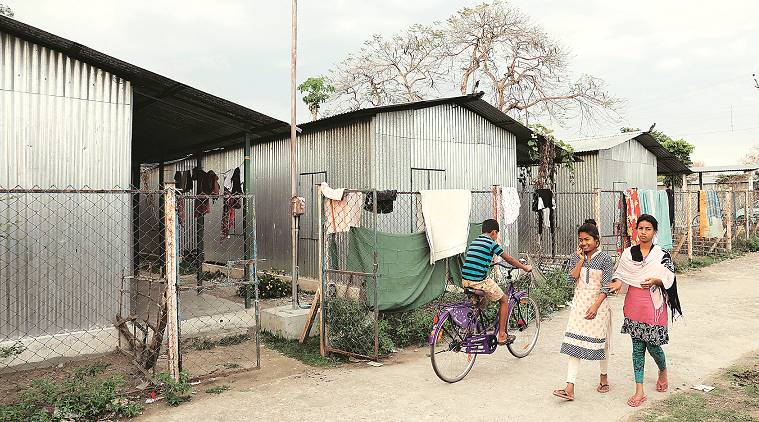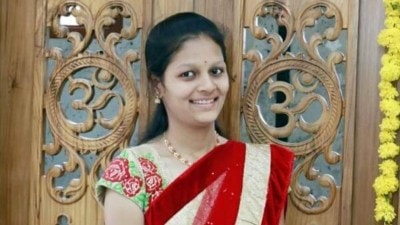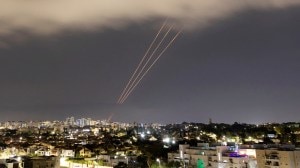- India
- International
Voting on April 11, former enclave dwellers in Cooch Behar want land, jobs
Voting for the first time to choose a government at the Centre, the expectations of the residents of the area are high from both the state and central governments.
 The temporary camp in Dinhata, Cooch Behar. (Express photo: Partha Paul)
The temporary camp in Dinhata, Cooch Behar. (Express photo: Partha Paul)
Sitting on the concrete veranda of a tin room, Gunjan Chandra Burman, 74, pulls out all the letters he has written to various authorities. His home is two tin rooms and his family is among the 58 — around 250 men, women and children — who live in a temporary camp in Dinhata, 28 km from Cooch Behar town, that was set up for people from Indian enclaves in Bangladesh when they decided to return in November 2015.
It’s been three years now, and they are yet to get the promised land.
About 60 km from Dinhata, Poaturkuthi, a former Bangladeshi enclave in India, has got new roads, solar-powered tubewells and an under-construction primary school. The process of handing over Indian deeds for land has started. But jobs are still elusive, forcing the youth to fan out across India.
Voting on April 11 for the first time to choose a government at the Centre, their expectations are high from both the state and central governments. This is not their first elections though — they had voted for the Assembly poll in 2016 and the Lok Sabha bypolls the same year.
Also Read | Didi now stands with people who want to break India: PM Narendra Modi

In Cooch Behar, TMC’s Paresh Adhikari is engaged in a tough fight with the BJP’s Nisith Pramanik, who joined the party after being sacked by Trinamool from the post of general secretary of its youth wing in the district. In his affidavit, he has declared 11 pending criminal cases. The Congress has pitted Pia Roy Choudhury and Left Front Gobindo Roy.
The Cooch Behar seat has been with Forward Bloc since 1977. In 2014, TMC’s Renuka Sinha won with 5,26,499 votes defeating Forward Block’s Dipak Kumar Roy by 87,106 votes. After Sinha’s death, TMC’s Partha Pratim Roy retained the seat with a huge margin of 4,13,241 against BJP’s Hem Chandra Burman. Both TMC (59.03 per cent) and BJP (28.32 per cent) increased their vote share by 19.52 per cent and 11.98 per cent, respectively.
Click here for more election news
It was at midnight on July 31, 2015, that 14,856 people in 51 Bangladeshi enclaves in Indian soil were absorbed in the country following a historic land agreement. Added to this were 921 people who left their homes in Indian enclaves located in Bangladesh — they came in phases that November to three makeshift camps in Dinhata, Mekhligunj and Haldibari in Cooch Behar.
During their campaign rallies in the state, Prime Minister Narendra Modi and TMC chief Mamata Banerjee claimed credit for the enclave exchange. “The land deal with Bangladesh was stuck for decades. We did it,” said Modi at a public rally in Cooch Behar town Sunday.
“I had 9.5 bigha of land in Bangladesh. We were given one month to sell. I could not sell it and therefore left my two sons Gopal and Mithun there. Here my wife and I stay with my third son and his family. Polls come and go, but there is no change in our condition. First, we were promised land, then apartments. Nothing happened so far. However, I will vote. I am waiting for the candidates to come here. Whoever helps us will get our votes,” says Burman whose son works as a daily-wage labourer.
Burman, like all others in the camp, hailed from the Dasiar Chora enclave in Bangladesh’s Kutigram district. “No one would buy our land there as they all knew we will be leaving for India. We left everything there, our home and three bigha agricultural land. We have written so many letters to everyone — from the District Magistrate to ministers. Nothing happened,” says Osman Gani, who stays in the camp with his wife and two children who have been enrolled in the local government school.
Residents claim that apart from their monthly ration, they get 50-55 days of work under the rural employment guarantee scheme. They say they have not been able to access other state or central schemes, such as old-age pension and a youth initiative of the state government.
Each family gets free ration, including 30 kg rice, 5 kg masur dal, 5 litres of mustard oil, 5 litres of kerosene, 1 kg packet of salt and 1 kg packet of milk powder per month from the government. “There are families which have eight to ten members, some are more. The ration gets over in two weeks,” says Mohammed Saheb Ali, 54, who lives with his wife and three sons in the camp.
Residents say they had completed the process for Voter ID and Aadhaar cards by 2016, but that discrepancies in details in the documents remain a problem.
At Poaturkuthi, 60 km away, the government has provided 20 solar-powered tube wells for irrigation, some of which have gone defunct. The enclave, which has got electricity and a community centre, is one among the 51 Bangladeshi areas that were absorbed in India in August 2015.
Just 5 km from the Bangladesh border, Poaturkuthi is spread across 1,200 acres, and is home to 3,037 men women and children from 479 families.
“There has been some development. But the handing over of our Indian land deeds are yet to be done. We are farmers and the papers are important to us to get loans or avail schemes. The process has started and we have got draft papers. Secondly, most of the youths are forced to work in Delhi, Mumbai and other places as masons and labourers. There is no opportunity here. We will vote for the party who will assure us jobs,” says Sajid Khan, 50, whose three sons work as labourers in Delhi.
In Puaturkuthi, residents say, there are around 40 youths who have completed secondary school and around two dozen graduates. Most of them venture out of Bengal for jobs as labourers in construction and agricultural fields.
“I have returned home to vote. Others are on their way. We will vote and leave after April 11. I will not say nothing happened. But those were basic amenities. What about jobs?” says Ainul Ali, 27, who works as an electrician in Mumbai.
For now though, the residents of these enclaves are at the centre of a tug-of-war for votes.
“Nearly 1,000 people came from Bangladesh. We are giving them free ration in temporary shelters. We are constructing 1,000 sq-ft apartments for each family. We are also trying to bring them under government schemes. There is ample opportunity of work here as labourers,” says Rabindranath Ghosh, North Bengal Development Minister and TMC leader from Cooch Behar.
“The government not only seems to have forgotten these people, but did not care to make a practical plan for their rehabilitation. Apartments are not a solution for rehabilitation of farmers. Over three years have passed and yet these people stay in camps. The Centre has allotted money for their development, which is being misused,” claims Diptiman Sengupta, convenor of the former Bharat-Bangladesh enclave exchange co-ordination committee, who has since joined the BJP.
Apr 19: Latest News
- 01
- 02
- 03
- 04
- 05






































